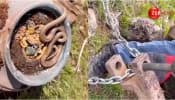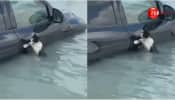Paris: A food shortage likely caused by climate change is shrinking a South Antarctic fur seal colony and changing the profile of its surviving members, researchers have said.
South Georgia island`s Antarctic fur seal pups have a lower average birth weight, and there are fewer breeding adults -- who hold out longer to reproduce than in the past, according to study results published in the journal Nature.
Only the biggest animals survive to adulthood and reproduce.
These are classic symptoms of long-term food stress, and emerged at the same time that availability of Antarctic krill, small crustaceans which are a fur seal staple, dwindled.
The authors yesterday linked this, in turn, to higher sea and air temperatures in the region, and a decline in sea ice.
"Climate change has reduced prey availability and caused a significant decline in seal birth weight," they wrote.
"We detected a 24-percent decline in the number of breeding females over the past 27 years."
Prior to this new decline, Antarctic fur seals bounced back from being hunted for their pelt to near extinction in the nineteenth century.
Another common feature of the breeding female seals was high "heterozygosity" -- that is the level of diversity in the genes they obtained from their parents.
The characteristic is linked to Darwin`s natural selection theory, as a heterozygous group of individuals carries a wider variety of genes that may allow adaptation to a changing environment through evolution in the future.
Evolution happens when natural selection leads to an increase in the frequency of one or more favourable gene variants in a population.
The team found that, counter-intuitively, evidence of natural selection for heterozygosity was not translating into an evolutionary benefit for the Georgia Island seal population.
Only individual genes can be passed on to offspring, not the complete code and not the trait of heterozygosity itself.
This means that many pups are born to "survival fit" mothers who are not "fit" themselves, and won`t make it to adulthood.
"The clock is effectively being reset with each generation," study co-author Joseph Hoffman of the University of Bielefeld`s Department of Animal Behaviour told AFP by email.















